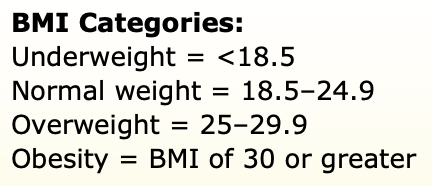Once upon a time in the early 19th century in Brussels, there was a mathematician named Lambert Adolphe Jacques Quetelet. Mr. Lambert took a strong interest in finding what the ideal “average man” was. What an interesting thing to study if I do say so myself. Odd.
Times were harsh in some areas of the land, and Lambert wanted to help the government find a way to allocate resources like food to people. How could one statistically measure “skinny to fat,” small to large, petit to grande? Lambert’s solution was the development of the Body Mass Index or BMI.
What is BMI? BMI is a value derived from your height and your weight. It’s body mass divided by the square of the body height. It is measured in units of kg/m2.
The following are the classifications under BMI:
Source: https://www.nhlbi.nih.gov/health/educational/lose_wt/BMI/bmicalc.htm
Let’s start off with the bad. First, the human body just isn’t that simple. The body is made of different substances (i.e. fat, muscle, bone, water). These substances have different weights. Take muscle, for example, it’s heavy! There’s a lot of water in it. Water is heavy. Fat is actually lighter. A pregnant women really throws the scale off. This concept is called body composition. Another problem is that the “average man” today isn’t that hundreds of years ago.
What about the good? Before you totally hate on BMI (which is not the point of this blog, by the way), there is some positive to it. You should keep track of your BMI over time. Your height doesn’t change much, right? Your weight likely does. It’s an objective measurement to know throughout life. Also, if you are towards the higher or lower end of the scale and you are suspecting you really do fit into that category of “underweight” or “overweight”, that’s extremely important to consider with your health.
The answer: BMI is not perfect.
BMI is one tool of many to determine your health. It’s important to know and to consider, but don’t swear by it all of the time. Consider things like DEXA scans for body composition, measuring waist circumference, and more to get a clearer, more holistic view of your health.
Don’t roll your eyes at Lambert yet. This man was extremely smart. Alongside BMI, he basically developed anthropometry which is the concept of looking at human variation. For example, your torso is shorter or longer than your friend’s torso. It can be the reason why some people can easily complete a movement task while others can’t. For example, touching your toes. Maybe you can’t touch your toes because your legs are longer than your torso and arms, not because your hamstring are too tight to do so.
Talk to a PT and your primary care to learn more about how your BMI relates to your overall health.



